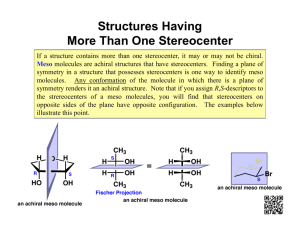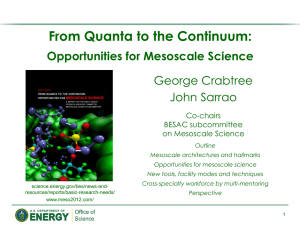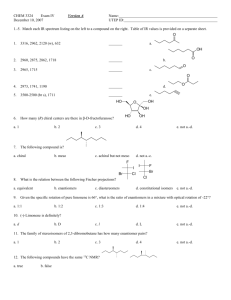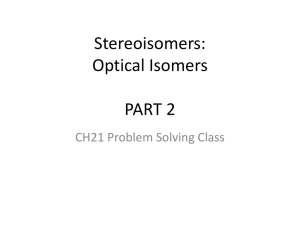pptx - MESO 2012
advertisement
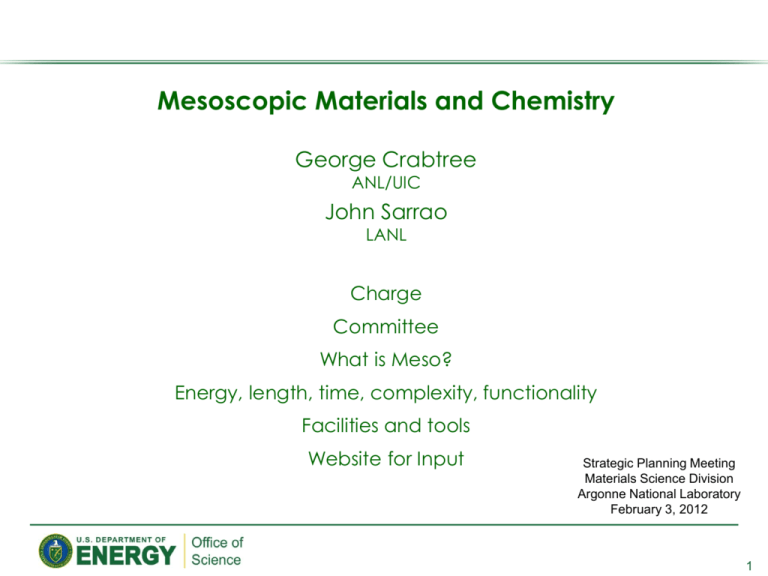
Mesoscopic Materials and Chemistry George Crabtree ANL/UIC John Sarrao LANL Charge Committee What is Meso? Energy, length, time, complexity, functionality Facilities and tools Website for Input Strategic Planning Meeting Materials Science Division Argonne National Laboratory February 3, 2012 1 The BESAC Charge on Mesoscale Science Excerpts from Dr. Brinkman’s charge letter: A central theme of these reports is the importance of atomic and molecular scale understanding of how nature works and how this relates to advancing the frontiers of science and innovation. I would now like BESAC to extend this work by addressing the research agenda for mesoscale science, the regime where classical, microscale science and nanoscale science meet. I see two parts to this new study: 1. Identify mesoscale science directions that are most promising for advancing the Department’s energy mission. 2. Identify how current and future BES facilities can impact mesoscale science. This study could prompt a national discussion of mesoscale science at the level heard during the initial formulation of the National Nanotechnology Initiative a decade ago. Report due early Fall 2012 2 3 The BESAC Meso Subcommittee John Sarrao, LANL, co-chair George Crabtree, ANL & UI-Chicago, BESAC, co-chair John Hemminger, Irvine, BESAC chair Bill Barletta, MIT, BESAC Gordon Brown, Stanford, BESAC Roger French, CWRU, BESAC Laura Greene, UIUC, BESAC Bruce Kay, PNNL, BESAC Mark Ratner, Northwestern, BESAC John Spence, Arizona, BESAC Doug Tobias, Irvine, BESAC John Tranquada, Brookhaven, BESAC Paul Alivasatos, LBNL Frank Bates, Minnesota Marc Kastner, MIT Jennifer Lewis, UIUC Tony Rollett, CMU Gary Rubloff, Maryland Andy Schwartz, BES Natalia Melcer, BES Eric Rohlfing, BES Harriet Kung, BES Relevant Background Why: the need for innovation, as articulated in e.g., Sci Tech report Why now: the insights and tools we’ve gained (and are still gaining) from nano, as articulated in e.g., New Era report What: build on the science challenges, as articulated in e.g., Grand Challenge report 4 What is Meso? 5 What is Meso? From the Greek In between, intermediate, middle Relative, not absolute atomic bulk meso 6 What is Meso? ΔE ~ n2h2/8ma2 E An Energy Scale of Mixing energy states mixed by thermal fluctuations ΔE ~ kT or h/τ a ΔE = 13.6 eV ~ .025 eV ~ 300 K ΔE ~ 0 E k continuous quantum atomic meso 0.1 nm 10 nm 100 nm 10-10 m 10-8 m 10-7 m macro 1000 nm 10-6 m Self-assembly by Thermal Mixing of Energy Levels Protein Folding http://www.biologyonline.org/articles/statistical_thermodynamics_taki ng_walk.html 8 What is Meso? Interacting Degrees of Freedom cathode Phenomena Ionization Ion insertion/extraction Electronic / ionic conduction Volume expansion/contraction Li+ ions solid-electrolyte-interface solid-electrolyte-interface electron s electrolyte anode Degrees of freedom Electronic Ionic Chemical mechanical Functionality Energy storage Energy delivery Reversibility on demand 9 What is Meso? The Gap between Top Down and Bottom Up Top down lithography to 10 nm remove material without atomic control Bottom up self-assembly from atomic and molecular scales build atom by atom placements Single molecule transistor “wiring up the nano world” Top down contacts to bottom up functional unit Quantum dots and molecular electronics Challenge: Connect chemical and electronic energy levels Au Au External communication with Internal energy levels Wenjie Liang, Matthew P. Shores, Marc Bockrath, Jeffrey R.Long & Hongkun Park, Nature 417, 725 (2002). 10 What is Meso? A time scale for each degree of freedom Electronic excitation 100 as http://ccisolar.caltech.edu/webpage/95 Electronic conduction 100 fs Solar water splitting system Mechanical deformation 10 fs - 10 ps Ionic conduction 10 ps SO - O SO3H+ 3 H+ H+ SO3O H+ SO3- O O Mesoscale phenomena and functionality All time scales contribute 11 What is Meso? An opportunity space At the meso scale, multiple degrees of freedom interact constructively: Complexity enables new phenomena and functionality Consilience of systems and architectures Biology is an inspiration and proof of principle Biological complexity with inorganic materials At the meso scale, multiple spatial and temporal scales meet: Quantum gives way to classical Top-down meets bottom-up Equilibrium is irrelevant: kinetics count At the meso scale, new organizing principles are needed Meso is beyond reductionist science What laws govern self-assembly? 12 Realizing the Meso Opportunity: Integration across Tools and Facilities Mesoscale Materials and Chemistry Theory Simulation Synthesis Characterization Supercomputing Facilities, Light Sources, Neutron Scattering Facilities, Electron Beam Microcharacterization Centers, Nanoscience Centers 13 Meso Tools and Facilities Characterization Theory and Computation - In situ and real time measurements - New organizing principles - in operating environments, non - Beyond average behavior, and destructive, in vivo perfect periodicity - Multi-modal experiments, e.g. - Spatially resolved measurements structure + excitation - Theory and expt in the same - Consider statistical variation of conditions complex meso samples - Understand ramifications of - Raw data vs analysis/interpretations; measurements (what is really being statistically significant results vs measured, esp given complexity) observations - Simulate synthesis outcomes - 4d materials science - Simulate functionality of - Faster processes/increased composite systems availability (e.g., fib/ serial sectioning, etc.; larger fields of view) - Measurement induced damage considerations (beyond probe and destroy) - Time scales attosec to decades Integration Synthesis Characterization Theory/Simulation Multiple simultaneous/concurrent measurements, including across length & time scales Complete suite of measurements on same/similar samples • including sample transport/interchangability between beam lines Co-design of experiment and simulation Synthesis - Rational synthesis of inorganic materials with lessons of organic chemistry in complex materials - Intrinsic complexity of materials at meso scale Ultraclean for bottoms up multi-step assembly sequencing of processes ultradirty facilities - Synthesis that can scale to manufacturing - Capacity/Capability to make populations/ensembles of samples -Need for model systems • • • • 14 Priority Directions/Key Themes –working titles based on initial meeting Damage Accumulation and Materials Lifetime Functional Mesoscale Systems Self and guided assembly in biology Reactive transport through mesoporous media Role of fluctuations in formulating organizing principles in meso-scale systems TOPICS TO FURTHER ELABORATE Electromagnetic phenomena Catalysis Non-living organic matter; health effects Mesoscale Priority Research Direction (INSERT TITLE) Opportunity Approach Brief overview of the underlying scientific challenge/current state of understanding What can be done to address the challenge? What are the key steps along the way? What new tools and techniques need to be developed to address the challenge? Meso Challenge What makes it meso? Impact How will pursuit of the research direction, including the meso opportunity, impact the scientific challenge? References: Contact: 16 Mesoscale Priority Research Direction Self-assembly of Inorganic Nanoparticles Opportunity Self-assembly of inorganic nanoparticles into larger architectures creates composite functionality and new phenomena of strong basic and applied interest. Architectures can be periodic or glassy, composed of one or various nanoparticle constituents, and extend in 1,2 or 3 dimensions. Phenomena include photonic, electronic, magnetic, catalytic, and acoustic behavior. Meso Challenge The challenge is to identify the architectures and compositions that lead to targeted mesoscale phenomena and functionalities, then direct selfassembly to express the desired architecture. Approach Various assembly approaches are possible, utilizing electrostatic interactions, dipole attractions, van del Waals forces, hydrogen bonding and hydrophilic/hydrophobic interactions. Polymers or DNA templates that are later removed can force metastable architectures; temperature and laser excitation can be used to promote or limit kinetic exploration of complex assemblies. Impact Self-assembled inorganic nanoparticles promise a host of new mesoscale phenomena and functionalities that require minimal material and thus reduce cost, place functional units in close proximity and thus increase speed and efficiency, and provide qualitatively new routes to targeted outcomes. M. Antonietti and G.A. Ozin, Promises and Problems of Mesoscale Materials Chemistry or Why Meso?, Chem. Eur. J. 10, 28 (2004) F. X. Redl, K.-S. Cho, C. B. Murray, S. O’Brien, 3D binary superlattices of magnetic nanocrystals and semiconductor quantum dots, Nature 423, 968 (2003) I. S. Beloborodov, A. V. Lopatin, V. M. Vinokur, K. B. Efetov, Granular Electronic Systems, Rev. Mod. Phys.79, 469 (2007) Y. Gao and Z. Tang, Design and Application of Inorganic Nanoparticle Superstructures: Current Status and Future Challenges, Small 7, 2133 (2011) 17 Meso Town Halls for Community Input Boston APS Wed Feb 29 5:45 PM Convention Center 253C MRS San Francisco Mon Apr 9 ACS Webinar April 24 Chicago middle May Special Kavli Symposium on Emergent Physics at the Mesoscale Wednesday, February 29th, 2012 at 2:30 pm (Boston Convention Center) Session Chair: Kate Kirby (APS) Speakers with Tentative Titles: Robert Laughlin M-02-20-02 - Perspectives in Emergent Mesocopic Physics William Phillips M-02-20-03 - Quantum Information and Mesoscale physics Angela Belcher M-02-20-04 - Self Assembly on the Mesoscale William Bialek M-02-20-05 - The Mesoscale Interface between Physics and Biology George Whitesides M-02-20-06 - Biological Physics on the Mesoscale 18 Meso Web Page for Background and Input http://www.meso2012.com Input wanted! 19


